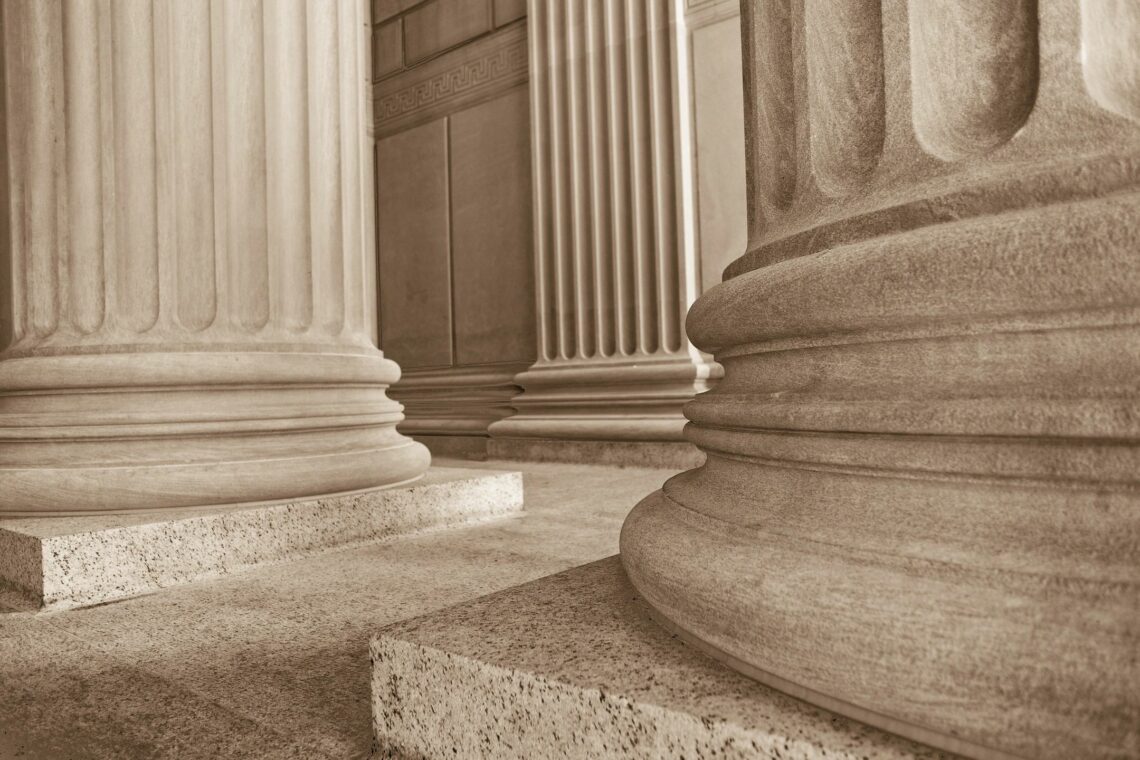In an era when people are both fascinated and cynical about politicians and governments, it is worth pausing to ask: what exactly is the purpose of government? What is it supposed to do?
In order to answer this question, we ought to first consider the kind of thing that is going to be governed – human beings. If we don’t know anything about human beings, it’s no good suggesting we know how to look after them. The problem is that we can’t merely consider them as they are now, under the authority of governments. Instead, we have to consider human beings as they might be without governments or institutions. Philosophers call this imaginary state the state of nature.
A State of Nature
What do you think life would be like for human beings if no state or society had yet been formed? How would they behave without the constraints of a code of law and the power of a state to enforce it? What you are imagining is the world in a state of nature. And whatever you think the world would be like in state of nature determines what you think is the purpose of government.
There were three prominent views espoused during the seventeenth and eighteenth centuries by Thomas Hobbes, Jean-Jacques Rousseau, and John Locke. They don’t exhaust all the options but are a fair representation of the dominant viewpoints upon which political viewpoints have been built.
Thomas Hobbes (1588-1679) wrote that in a state of nature, we would live a wretched life. He famously suggested that the life of human beings in a state of nature would be “solitary, poor, nasty, brutish, and short.” (Hobbes, 1651). Hobbes thought that, in a state of nature, human beings would be fairly horrible to one another, living in a constant state of conflict over scarce resources. For this reason Hobbes thought that we should have strong government to prevent us slipping back into a state of nature. The primary purpose of government, according to Hobbes, is to impose order and prevent a descent into strife.
The question to ask is: why does Hobbes think we would be in a state of war if we lived in a state of nature? The answer lies with Hobbes’ view of human nature. According to Hobbes, our knowledge of human nature can be derived from two sources: (i) reflection on our own desires, thoughts, and fears and (ii) the laws of physics.
The laws of physics suggest to Hobbes that objects continue in motion unless they are stopped. The human being is a material thing. Thus, it is subject to the laws of physics. Hobbes claimed that human beings are like machines operating on their internal desires, fears, and hopes. Since they only stopped when an external force is applied, they will keep on going in search of what will allay their fears and fulfill their desires. If human beings are as Hobbes describes them and there are not enough resources to be had, then fighting follows. Once conflict has begun, it will be almost impossible to stop without the imposition of a powerful, forceful state.
In contrast to Hobbes, Jean-Jacques Rousseau (1712-1778) thought that, in a state of nature, human beings would be able to preserve themselves perfectly well: “I see him satisfying his hunger at the first oak, and slaking his thirst at the first brook; finding his bed at the foot of the tree which afforded him a repast; and, with that, all his wants supplied.” (Rousseau, 1755). In fact, Rousseau thought that life in a state of nature was idilic. Thus, he was somewhat disappointed that civilization had developed. According to Rousseau, to civilize human beings is to rob them of something. Human beings are like wild animals that have been domesticated – they’ve become weaker and more dependent than they were in the wild.
Although Rousseau is somewhat negative about government, he thought that we could make the best of what we’ve got. He thought that the state’s purpose was to create the conditions for human flourishing. This entailed having a conception of the common good to which all else was subservient. The job of government was to determine what this ought to be and carry it out. Since human beings are basically good, governments ought to be able to create environments in which we can flourish. It may never be as good as a state of nature, but pretty good nonetheless.
John Locke (1632-1704) thought that although the state of nature does not contain any form of government, it is nonetheless not without a form of law. He argues that humans in a state of nature are bound by a ‘law of nature’ through which they are granted natural rights. People in a state of nature are free but only to do what the Law of Nature allows. They are also equal with one another. No one has an automatic right to rule. This was in contrast to the feudalism of Locke’s day in which political power was often conferred on people merely because they were born to the correct family. In a state of nature everyone is bound by the Law of Nature: “no one ought to harm another in his life, liberty, or possessions.” (in Wolf, 2006).
So far, Locke has not suggested any reason why the state of nature would not be a state of war. Nor does he say what would motivate humans to obey the Law of Nature. Indeed, he says that we are not automatically motivated to obey it. What we need is some external restraint, but the state of nature has no government and so no means of offering incentives such as rewards or punishments.
Thus, Locke proposes another natural right: the right to punish. The right to punish is the right to ‘make anyone who has overstepped the Law of Nature pay for their transgression.’ If the Law of Nature can be enforced either by individuals or groups who carry out punishments against those who break it, then, Locke thinks, we can live in relative peace in a state of nature.
Let us grant that there is a Law of Nature and that people have a natural right to punish and even that there is no scarcity of goods. It is still not certain that the state of Nature would not be a state of war. Not everyone is nice, and some will be prone to violence anyway. When deliberating over the just punishment for a given offender, people will likely fight over what is just and what is not. Populations grow and this would lead inevitably to scarcity. Locke concedes all these points and he proposes that at such a time that all those conditions are in place the establishment of a government becomes an imperative.
Locke’s view of the purpose of government is generated by his conception of the natural laws. Since those laws are about the rights of individuals (to life, liberty, and the pursuit of their own goods), the purpose of government is to protect those rights and take on the responsibility (generated by natural law) to punish those who violate the rights of others.
A Biblical View?
What does the Bible have to say about the point of government?
First, the Bible teaches that lack of government leads to great evil. In Judges, the people had no governing power. Consequently, they committed grave evils. The book repeats the following refrain: “There was no king in Israel. Everyone did what was right in his own eyes.” Thus, to some degree, a primary purpose for government is the restraint of evil.
Second, the Bible tells us that God initiated government when he gave Noah the command to punish murderers with the death penalty (Gen 9:5-6). Once this command is given, we can assume that lesser crimes also warranted lesser punishments.
The Bible teaches that punishment is a vital task for governing authorities. As the writer of Ecclesiastes teaches, when evil goes unpunished, evil spreads and grows worse: “Because the sentence against an evil deed is not executed speedily, the heart of the children of man is fully set to do evil” (Eccl. 8:11). Paul taught that the God ordains governments as his instruments to punish evil: “rulers are not a terror to good conduct, but to bad” (Rom 13:1-7). Likewise, Peter taught that “governors as sent by [God] to punish those who do evil and to praise those who do good” (1 Peter 2:13–14).
Finally, the Bible is clear that human beings are obligated to obey God. During the Old Covenant, the nation of Israel was obligated to obey the Mosaic Law; during the New Covenant era, Christians are obliged to obey the Law of Christ (or Law of Love). The Bible also refers to a Law written on the heart, a kind of Law code available to everyone and according to which everyone is obliged to live.
So, how does the Bible’s teaching compare with the views of Hobbes, Rousseau, and Locke?
Well, first, the Bible teaches that lack of restraint does allow sinful people to commit more evil than if they have some external restraint. Thus, we can conclude that Rousseau’s view is false. If left to our own devices, we would not live an idyllic life as Rousseau suggests. Indeed, Christians don’t think that civilization is a corruption of an idillic state nor do they believe that one can cause human beings to flourish merely through controlling their environment. In contrast, Christians believe that human beings are inclined to evil (thus requiring some restraint) and that their problem lies not in the social environment but in their hearts.
Does it then follow that Hobbes correct? Not necessarily. His view is right when he says we require the restraint government can provide, but on his view there is no moral component. We simply operate according to our physical natures. In a state of nature, according to Hobbes, there is no such thing as right and wrong. It is only upon the establishment of the state that one can write laws, but those laws are not expressions of some prior existing moral law. Thus, Hobbe’s view is incompatible with a Christian view. Christians think that some things are right and wrong whatever laws human governments make.
Does Locke’s view accord better with what Christians believe? Out of the three views we have looked at, the answer is: yes.
Here’s why: Locke recognizes that human beings are not basically good. Thus, they require some means to restrain their actions. He also recognizes that there is a moral law that would exist even if there was no government, something with which Christians agree. He describes this law in terms of rights: the right to life, liberty, and the pursuit of their own good. These cohere with Biblical commands to not murder, steal from, or oppress others.
For Locke, it is the collection of individual rights that grants a purpose for government: the protection of those rights though enforcing laws that prevent their violation. This cohere’s with the Bible’s view that governments are supposed to serve as God’s means to restrain evil. Thus, Locke’s view is more consistent with the Bible’s teaching than either the views of Hobbes or Rousseau.
Bibliography
Feinberg, J., & Feinberg, P. (2010). Ethics for a Brave New World.Wheaton: Crossway.
Grudem, W. (2010). Politics According to the Bible.Grand Rapids: Zondervan.
Hobbes, T. (1651). Leviathan.
Locke, J. (1764). Second Treatise of Government.
Pojman, L. (1997). On Equal Worth: A Critique of Contemporary Egalitarianism. In Equality: Selected Readings(pp. 282-298). New York: Oxford University Press.
Rousseau, J.-J. (1755). Discourse on the Origin of Inequality.
Tocqueville, A. d. (1840). Democracy in America.
Wolf, J. (2006). An Introduction to Political Philosophy.New York: Oxford University Press.





